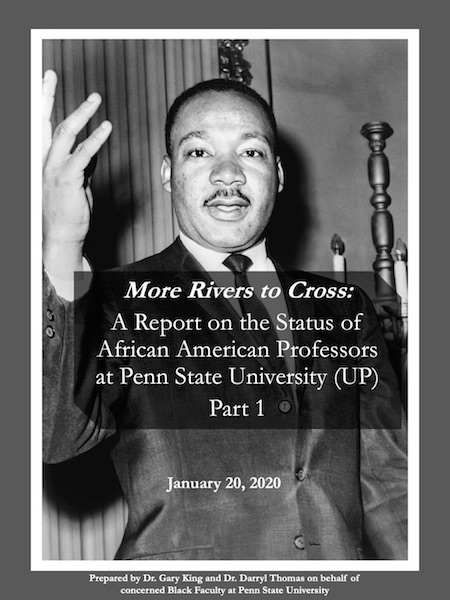 A new study by Gary King, a professor of biobehavioral health, and Darryl Thomas, an associate professor of African American studies, examines the status of African Americans on the faculty of Pennsylvania State University.
A new study by Gary King, a professor of biobehavioral health, and Darryl Thomas, an associate professor of African American studies, examines the status of African Americans on the faculty of Pennsylvania State University.
The report notes that”although the first Black student, Calvin Waller, entered Penn State in 1899 more than 40 years after it was founded, the first full-time African American professor, Mary E. Godfrey, was not hired until 1956 as an assistant professor of art education. Charles T. Davis began service in 1961 as an associate professor and became the first Black professor promoted with tenure to full professor in 1963.” By 1975, there were 35 Black faculty members at Penn State but they made up only 1 percent of the total faculty.
Today, African Americans make up 10.6 percent of the population of Pennsylvania. But only 4.1 percent of the student body at the state’s flagship university is Black. The report, using data from the Penn State Office of Planning and Assessment states that in 2018 there were 3,822 full-time faculty members at Penn State. That year, there were 112 Black faculty members. Thus, Blacks made up 2.9 percent of the total faculty.
In 2004, there were 83 tenured or tenure-track Black faculty at Penn State. By 2018, the number had dropped to 68. In 2004, tenured and tenure-track African American faculty comprised 76.1 percent of all Black professors, however by 2018 this proportion had decreased to 60.7 percent.
In 2018 there were 23 Black full professors, the exact same number as in 2008. There were 30 Black associate professors in 2018 compared to 37 in 2004.

The full report, More Rivers to Cross: A Report on the Status of African American Professors at Penn State University, may be downloaded by clicking here.

